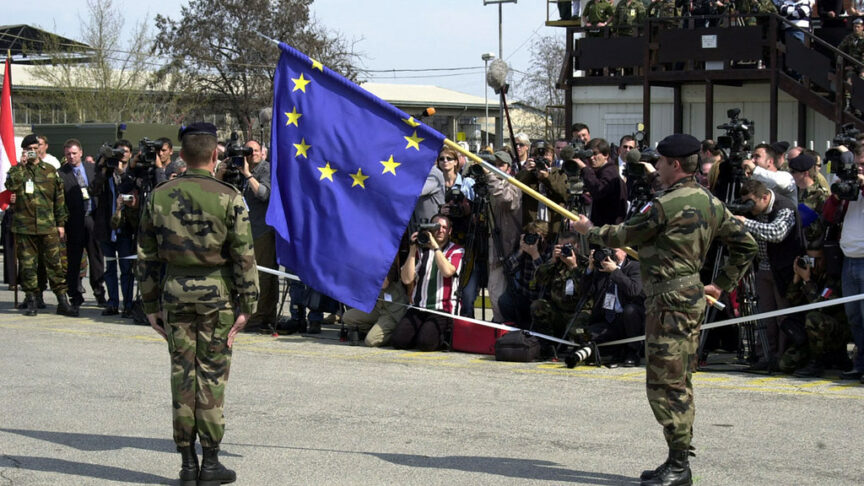UK (Parliament Politic Magazine) – Ben Wallace, in his inaugural international engagement following his tenure as the UK’s defense secretary, took aim at “certain prominent European nations.” He cautioned that they may not adhere to their commitments regarding defense expenditure.
Addressing the audience via a virtual platform at the Riga Conference in Latvia, a forum focused on security matters, Wallace advised Baltic nations to exert pressure on their more affluent European allies to fulfill their pledge of allocating 2 percent of their GDP to defense.
He sounded a warning that the momentum behind this drive to bolster defense spending, sparked by Russia’s incursion into Ukraine, could be waning.
Defense Spending Concerns in Major European NATO Nations
Responding to a query about NATO countries’ foremost concerns, Wallace remarked, “I have reservations about certain sizable European nations sustaining their 2 percent commitment over the long haul. I anticipate that numerous pledges, including those set for 2030, may not come to fruition or be fully honored.
Furthermore, he noted, “I’ve observed a shift in rhetoric from some of the major European nations. They appear to be retracting from their commitments, and it remains to be seen whether they are genuinely willing to uphold their 2 percent budget allocation.”
Although Wallace refrained from naming the countries, it’s worth noting that two of the wealthiest EU member states, Germany and France, have both made commitments to increase their defense expenditures.
Germany’s Chancellor Olaf Scholz introduced a significant shift in defense spending last year known as the “Zeitenwende,” pledging approximately €100 billion, roughly twice the annual defense budget, for the revitalization of its military capabilities. As of this year, Germany has committed to this budget reallocation, though the funds remain unspent. Berlin has clarified that the funds will only be transferred once the aircraft, uniforms, and other ordered equipment materialize.
NATO Members’ Commitment to Defense Spending Targets
Despite this financial injection, NATO’s estimates, released in July, indicate that Germany will allocate just 1.57 percent of its GDP to defense spending this year.
In January, French President Emmanuel Macron unveiled plans to increase military funding from €295 billion to €413 billion for the 2024-2030 period to modernize the armed forces. Nevertheless, France’s annual defense expenditure remains at 1.9 percent of its GDP.
For the current year, only 11 out of the 31 alliance members are anticipated to achieve the 2 percent spending target. This marks an improvement from the previous year when only seven nations were on course to meet the commitment.
The United Kingdom has historically maintained defense spending levels above the 2 percent threshold, with this year’s estimated defense budget standing at 2.07 percent of its GDP.
UK’s Consistent Defense Budget Above 2 Percent of GDP
Speaking on a different panel, NATO’s Assistant Secretary-General for Intelligence and Security, David Cattler, expressed a more optimistic outlook. He stated, “Between the Madrid and Vilnius summits last year and this year, it became abundantly clear that 2 percent should be considered the minimum requirement.”
Cattler further elaborated, saying, “When leaders of the allies engaged in this discussion, they also recognized that there are certain expenditures and costs that must be shared by individual nations and the alliance as a whole.
This includes investments to address deficiencies, make up for shortcomings, and develop additional capabilities. That’s why you’ll witness more and more allies not only meeting the 2 percent target but surpassing it.”
Read More: Britain’s Science Agreement with the European Union in the Post-Brexit Era
NATO’s Quest to Strengthen and Modernize Amidst Global Challenges
Wallace urged NATO member countries to demonstrate their commitment to countering Russian President Vladimir Putin by emphasizing their seriousness in terms of strengthening their armed forces, enhancing their equipment, and engaging in joint exercises. He noted, “Before the events in Ukraine, NATO’s progress was rather sluggish.”
“We must make up for lost time,” he emphasized, “and that’s where our investments are directed. Moreover, we should not merely pay lip service to NATO’s regional plans but actually deploy forces in a tangible and effective manner.”
Wallace resigned from the British government in July, stating that he would not seek re-election in the next general election. He had been considered a potential candidate for the role of NATO secretary-general, but the alliance chose to extend Jens Stoltenberg’s term by one year in early July.

